campusM Activation Guide
The purpose of this document is to provide background knowledge regarding the campusM activation process and to explain the requirements necessary to implement campusM.
Overview
Introduction to campusM
Ex Libris' campusM is a powerful multi-service integration platform that enables creation and maintenance of a mobile app that provides your staff and students personalized access to Institution/HE services and information.
The app you create using campusM is available as an app store download for iOS (Apple) and Android (Google) and can also be made accessible via a Web browser for PC or mobile browser use. The app can be used as your Institution’s student portal, replacing existing, less flexible, and less robust in-house Web-only systems.
For an overview of the campusM app, including product features and benefits of the campusM structure and workflow, see campusM Introduction.
campusM Implementation Methodology
Throughout the Activation phases, regular communication channels are established including an online primary communication platform via Basecamp and weekly status meetings to help ensure a shared understanding of your progress to date and the tasks yet to be performed.
The status calls are usually conducted between the Ex Libris Project Manager and your assigned project manager. Other project team members may participate in such calls as required.
The campusM Activation will take its path through three main phases, which start at the Kickoff meeting.
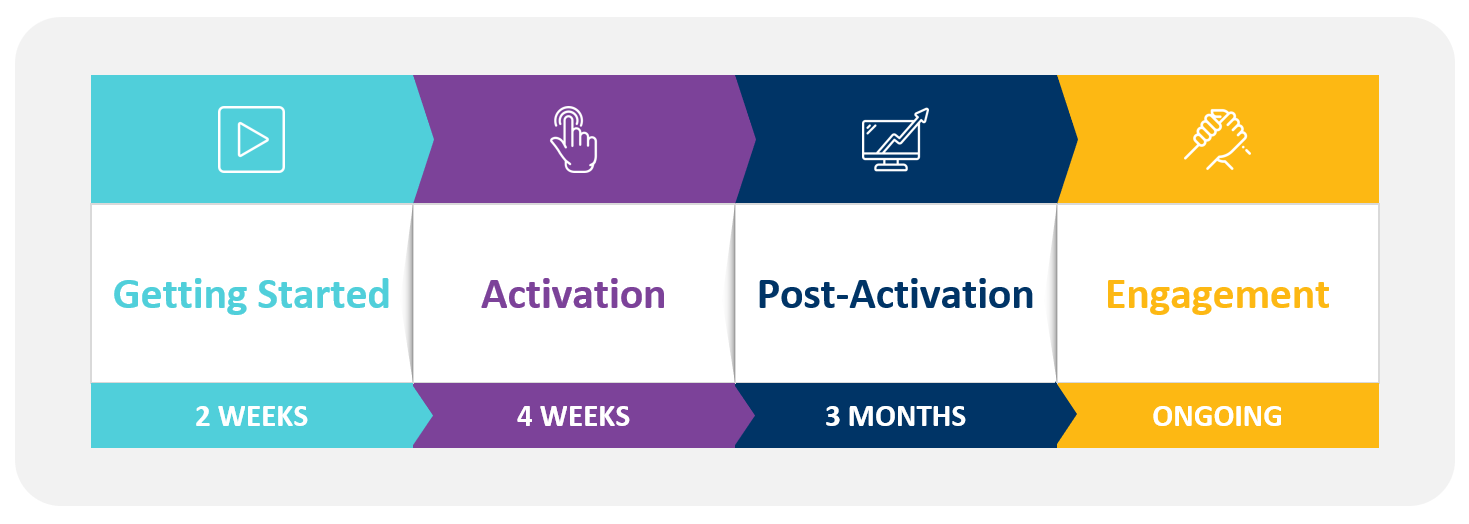
For more information, see campusM Implementation Methodology.
Customer Project Team - Roles and Responsibilities
To have effective communication between you and Ex Libris, your core team will typically consist of several stakeholders/functions, responsible for the overall success of the app, initially – and possibly different stakeholders who will own the app on an ongoing basis, including:
-
Project Owner / PM: Main liaison for the Implementation. Manages progress, internal comms and planning, app deployment, roadmap. For example, this may be someone from IT or Student affairs.
-
Product Owner: The key business facilitator who owns and ensures value realization through usage & student engagement. This owner may be the same / part of one of the other functions described.
-
App Administrator: Responsible for technical app configuration, admin, testing, and maintenance.
-
Content & Marketing: Involved in app communication including content management and marketing. For example, this may involve the office of Student Affairs.
-
System Experts: Technical subject matter expert(s) to support system integrations.
Project Communication
Communication Types
Kickoff Meeting
The campusM kickoff is the first Activation meeting. During this meeting, we’ll establish a communication method between Ex Libris and your team.
The meeting will focus on team introductions, an overview of campusM, a review of the full activation process, and an introduction to the following steps.
Weekly Calls
Ex Libris will communicate on a regular basis with your assigned lead contact(s) and with your relevant technical staff throughout the Activation process.
Weekly calls will be held between project managers and will include other technical teams, as needed.
Communication Tools
Microsoft Teams
Ex Libris uses Microsoft Teams for all online meetings and training offerings. Additionally, we recommend that customers have the following equipment available:
- A monitor for individual viewing and the ability to project on a large screen for group viewing
- Speakers and a microphone or telephone with conference call or hands-free capability for audio participation
Basecamp
Basecamp is a Web based communication tool that enables individuals with different roles and responsibilities to communicate and work together while enabling all project stakeholders to keep track of all deliverables, milestones, potential issues, queries, data, and file sharing.
Click here for a Basecamp tour.
campusM Architecture
campusM Solution Diagram
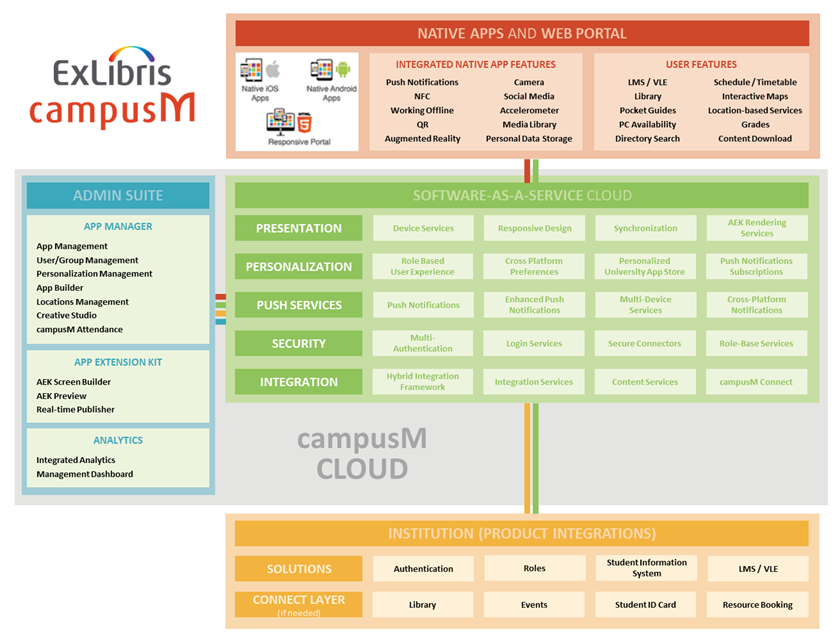
campusM Cloud Environments
- Production – this environment is the live version used by your end-users to access campusM as well as where you add static content during the Activation process.
- Sandbox – this environment is used for developing and testing content and experiences before committing those changes to Production. Sandbox is most useful post-activation after your app is live on production.
- Preview – this environment is used to give you a sneak preview of future campusM features and fixes which will be released the following month on Production; enabling you to check them and determine which may be relevant for your institution. A snapshot of Production is taken a week before the Preview release date to be used to automatically clone the app content from your Production environment into your Preview Environment. This way, the controlled tests you perform are as close to live as possible.
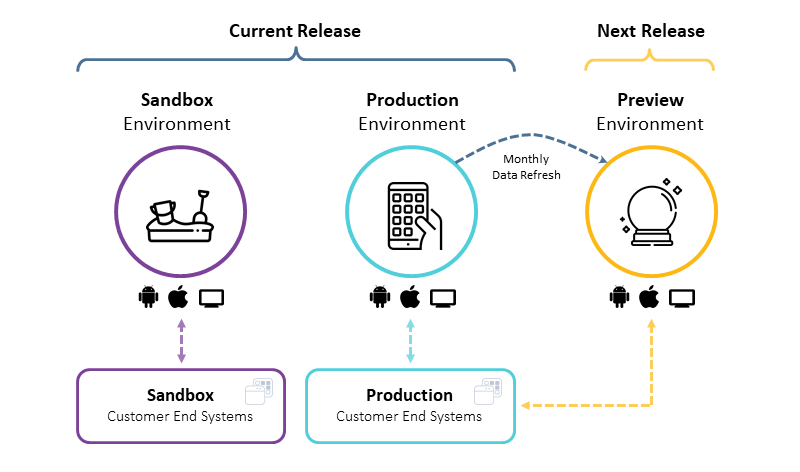
For further information see Preview and Sandbox Environments.
Platforms
Native App (Internal Limited Access) – Firebase
Firebase is used by campusM to distribute iOS and Android Sandbox, Preview, and Production releases to app testers. To become a tester for an app, you must receive an invitation to test a specific app. When a Beta version of the app becomes available for you to test, you will receive an email notification with a link to the app installation file.
For more information, see Firebase Beta Testing Overview.
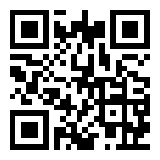 |
Android testers can install Android releases on their device immediately and do not require releases to be provisioned for specific devices. |
|
iOS testers need to register iOS devices with Firebase and wait for Ex Libris to provision the app for the new device. |
Native App (Public) – App Store and Google Play Store
Only the Production Environment App, which is referred to as the “Release Candidate” in Firebase, will be submitted at the end of the Activation Phase to the Apple and Google Stores.
Web App
In addition to the mobile apps for iOS and Android, you will be provided with a Web App for Production, Sandbox, and Preview for users to access via their PC browser or mobile browser.
By default, your web app domain convention is: <cust_code>
However, it is possible to request a Custom Domain Name to be used for your campusM hosted DNS.
Custom Domain Name (optional)
| Complexity Level | Medium |
| Customer Owner | IT (typically) |
| Required for activation | No (Optional) |
| More information | Working with Custom Domain Names |
| Configuration Form |
A custom domain is a unique, branded name that identifies a website. When using a private domain name on a hosted server, Ex Libris will coordinate a series of specific steps with you to enable this option.
Activation Configuration Forms
campusM is designed to be highly configurable and can fit the needs of a very diverse customer base. The first phase of the overall activation process is the Activation Phase, during which your Ex Libris Project Manager will configure the app and environment based on the information you provide through targeted and structured configuration forms. Once the Activation Phase is completed, your app will be available publicly on the stores and on your users’ devices. At that point, we'll start the second phase, Post-Activation, during which we’ll provide training and guidance on how to manage and enrich the app.
Before we can start with the app activation process, we will require your input via the following configuration forms. Please complete the forms with as much information as possible.
All forms can be downloaded here.
App Authentication
| Complexity Level | Medium |
| Customer Owner | IT (typically) |
| Required for activation | Yes |
| More information |
Managing Token Based Authentication |
| Configuration Form |
campusM enables you to group end-users into types and present the end-user with the content, services, and branding for each specific type; this is managed by Profiles and Roles in the App manager tool. App Profiles may be authenticated, anonymous, or require registration.
campusM Authentication (CMAuth) is a standardized token-based authentication mechanism and framework that seamlessly supports the handshake, validation, and mapping attributes for authenticated users using standard SAML 2.0 and OAuth 2.0 based systems.
App Branding
| Complexity Level | Low |
| Customer Owner | Marketing (typically) |
| Required for activation | Yes (can be changed at any point in time) |
| More information | |
| Configuration Form |
Your campusM app and portal branding are fully customizable based on the campusM branding options and your inputs, while the campusM App Builder component in App Manager provides you with full control over the look-and-feel of the app.
There are many design options at your disposal, including icon colors & styles, text color & style, tile backgrounds & borders, and much more. Below are a few examples:
| Clear Tiles with Top Banner | Full Lines Tiles |
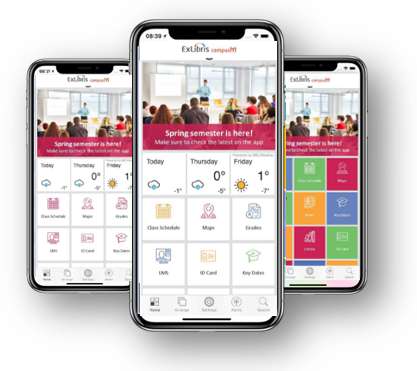 |
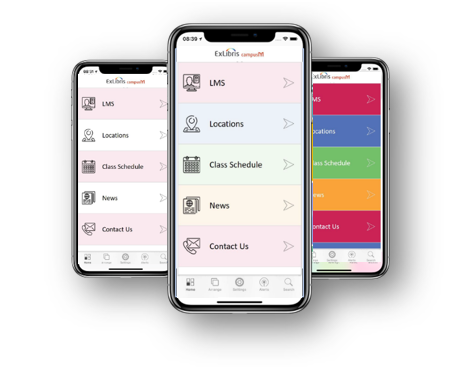 |
| Semi-Transparent Tiles with Background Image | |
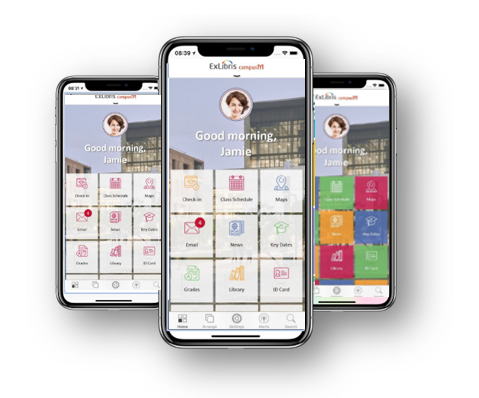 |
|
App Store Listing
| Complexity Level | Medium |
| Customer Owner | Marketing, Communications, Student Affairs (typically) |
| Required for activation | Yes, can be updated during post-activation and post go-live |
| More information |
Google Play App Store Page Submissions |
| Configuration Form |
The App Store Listing is used when the app is submitted to Apple and Google stores for approval and contains all the formal information needed to submit the app, such as app name, app long name, keywords, app description, etc.
Developer Accounts
| Complexity Level | Medium |
| Customer Owner | IT (typically) |
| Required for activation | Yes, can be updated during post-activation and post go-live |
| More information |
Apple Developer and iTunes Connect Account |
| Configuration Form |
The Developer Accounts are used to create the app center testing apps for Sandbox, Preview, and Production environments, required for submitting to Apple and Google stores and receiving their approval, as well as for updating the app version on an ongoing basis once the app is live.
Information and Content Pages (Creative Studio)
| Complexity Level | Low |
| Customer Owner | Marketing, Communications, Student Affairs (typically) |
| Required for activation | No, can be completed during post-activation and post go-live |
| More information | Managing Creative Studio |
| Configuration Form |
Your campusM app can include an allowance for your definition of an unlimited number of information and content pages. Content pages can be optionally arranged in hierarchical menus and can provide relevant information to your users, including contact us information, emergency numbers, and procedures relevant to your institution.
Using Creative studio, a lightweight, no-code content management module, you can design and create rich, fully-branded information pages leveraging easy-to-use out-of-the-box templates, built-in components (maps, videos, etc.) that can easily be published to production.
Maps and Locations
| Complexity Level | Medium |
| Customer Owner | Marketing, Communications, Student Affairs (typically) |
| Required for activation | No, can be completed during post-activation and post go-live |
| More information |
Maps and Locations |
| Configuration Form |
campusM can provide end-users with campus maps that include precise location information for rooms, buildings, and other facilities on your campus. Users can browse different locations by location categories, such as dining, libraries, or academic buildings. Campus maps, locations, and positions enable end-users to interact with the native map on iOS or Android to provide them with useful locale information.
Product Integrations and Features
| Complexity Level | High |
| Customer Owner | IT (typically) |
| Required for activation | No, can be completed during post-activation and post go-live |
| More information |
Getting started with product Integrations |
Product Integrations are built-in functions to campusM which enable institutions to add, edit, and configure key integrations with University systems with no need for development coding or services.
With a constantly growing list of out-of-the-box integrations, institutions can enhance the user experience with just a few clicks using the campusM App Manager.

Post Activation Education
Essential Training Agenda
| Complexity Level | Low |
| Customer Owner | Marketing, Communications, Student Affairs (typically) |
| More information |
Online Training
| Complexity Level | Low |
| Customer Owner | Marketing, Communications, Student Affairs (typically) |
| More information |
Initial steps in campusM |
Ex Libris delivers training for the campusM administration interface, App Manager, and provides several related introductory and more advanced training recordings.
In addition to the training recordings, Ex Libris provides a robust set of references and How To documentation that enables you to discover more about the campusM product and its ever-growing capabilities, all available on the Ex Libris Knowledge Center.
Life in Production – Ongoing Engagement
Ex Libris supports a growing campusM community that engages its members through an array of channels, including the Developer network, useful knowledge resources on our Central Knowledge Center, regional user conferences, and the online customer Slack channel where other campusM users can share experiences and best practices, and Ex Libris can provide important product-related updates.
Additionally, a campusM success representative will be available for periodic business reviews to ensure you have what you need and are able to maximize the value of your app over time.
campusM's robust platform also optionally enables institutions with the relevant technical skills to extend and add to the standard functionalities campusM offers. This can be done via a wide framework of developer tools, including the Application Extension Kit (AEK), enabling you to create custom user interface tiles and functionalities. Additionally, each campusM institution will be provided a secure API key unique to their organization which allows invoking various core campusM functions programmatically, including Push notifications, Analytics and User/Role sync updates. These advanced tools are not required to run campusM but can be very useful for institutions with available development resources who would like to extend and add functionality to their apps.
Support Overview
Ex Libris is committed to providing customers with timely and accurate customer service. Standard Ex Libris support is provided Mon-Fri, 8:30 am to 5:30 pm; U.S. Central time (NA region), UK time (EMEA region), and Australian Central time (APAC region). Support for critical issues, including a down system, is provided 24x7 including weekends and holidays.
Requests for support sent as Cases from our Salesforce system are assigned response levels to help us prioritize issues, communicate in a timely manner and provide a means for us to measure our performance. To provide support in an efficient manner, it is required that Ex Libris be provided with working app credentials and an appropriate scenario as well.
For further information see the following links:
How do I request a Support Portal Login for a new staff member? Use this link.
Need help? Send an email to PQ-campusM-Support@clarivate.com.
Ex Libris Community and Knowledge Platforms
Status Page
Enables you to register for alerts and scheduled maintenance notices on the campusM hosting environment.
-
For more information, see Real-Time Monitoring of Ex Libris Cloud Instances Status
-
Access the Status Page
Ex Libris Knowledge Center (CKC)
A valuable reference site for product documentation, training, release notes, and knowledge articles. Accessible as a quick link from within App Manager. Access the Knowledge Center.
Developer Network
A centralized site with useful information for developers, including AEK and useful resources for APIs and integrations with campusM. Access the Developer Network.
Idea Exchange
Enables users to share, support, and discuss ideas with the Ex Libris user community. Anyone can participate by providing your name and an institutional email address. Access the Idea Exchange.
Slack Channel
A great place to share information and experiences between campusM institutions. It is also a way to directly interact with campusM staff and development. Join campusM Slack Channel.
Additional Product Information
Trust Center
Ex Libris is committed to General Data Protection Regulation (GDPR) compliance. Our engineering, product, security, and legal teams have been working to align our procedures, documentation, contracts, and services to support compliance with the GDPR.
We also support our customers with their GDPR compliance journey with our strong foundation of implemented security and privacy frameworks and certified security and privacy controls.
-
For more information about the Trust Center
-
For more information about GDPR in Ex-Libris
-
For more information about Support Requests and GDPR
Accessibility Statement
All students, regardless of ability, need access to University information. ProQuest and Ex Libris are committed to providing our users with a fully accessible experience for research, teaching, and learning.
At ProQuest and Ex Libris, we make every effort to ensure that our platforms – including campusM – can be used by everyone. campusM is continually designed and developed to meet Level AA of the W3C Web Content Accessibility Guidelines (WCAG 2.1) and Section 508 of the US Rehabilitation Act for features and functions.
-
For further information, see Accessibility Statement.
-
For Ex Libris campusM> Certificate and details, see campusM Application.
Product Release Cycle
As part of our commitment to ensure your app remains current and engaging, we have an agile development process that is underpinned with monthly releases. These releases are clearly scheduled and are packaged together with comprehensive release notes.
For additional information, see campusM Release Cycle.

